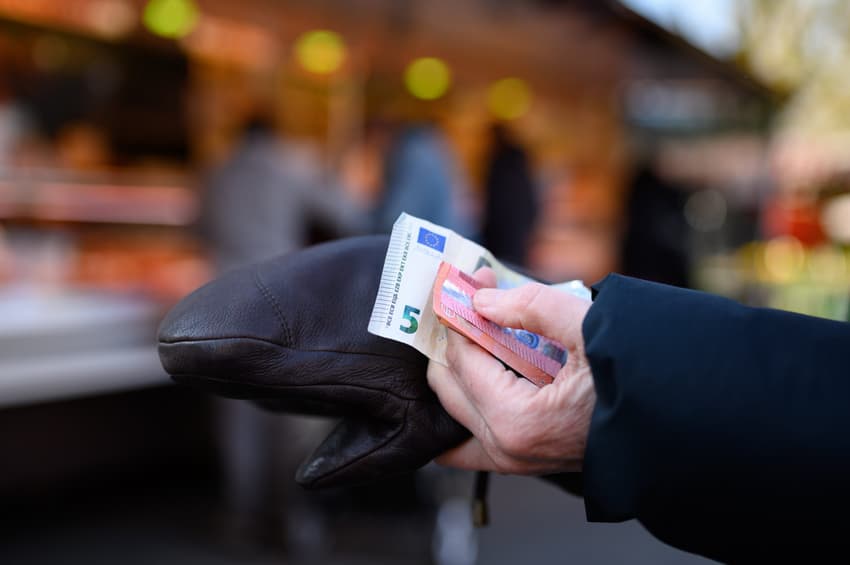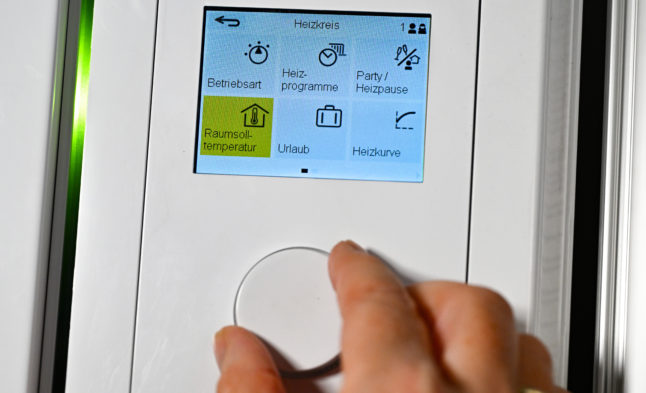What you need to know about Germany's €300 energy relief payout

Workers in Germany will start to receive a €300 payment from September to help with rising energy costs. But many people will not get the full amount. Here's what you need to know.
What's happening?
Back in May, the German government approved a package aimed at providing financial relief to the energy and subsequent cost of living crisis.
One of the measures was a €300 allowance for people in employment, known as the Energiepreispauschale or EEP, which employers are required to pay out. Self-employed people can deduct it from their advance tax payments from September or when they submit their tax return next year.
READ ALSO: How much money will you get from Germany's energy relief measures?
What's it for?
There is only one direction that energy costs are going, and that is all the way up. Following the invasion by Russia on Ukraine in February, the cost of gas in particular has skyrocketed. Electricity is also increasing in price, contributing to more household woes. All of this has caused inflation to rise, meaning the cost of everyday products - whether it's butter, bread or meat - have also spiralled upwards.
READ ALSO:
- 8 simple ways you can save on heating costs in Germany
- How customers in Germany can tackle rising energy bills
Who gets it?
It's for all workers who pay tax and social insurance contributions in 2022. This includes employees, civil servants, freelancers, trainees and paid interns as well as cross-border commuters who live in Germany but travel to another country to work.
Great, does that mean I get the whole €300?
Not quite. The €300 is subject to tax. So those who pay a higher tax rate will get less than those on a lower rate. People who earn below the basic tax-free allowance (that means they don't earn enough to pay any tax) will benefit from the full amount.
On average, employees will receive €193 from the €300 allowance, according to the Finance Ministry.

A person adjusts the temperature on a heating system. Photo: picture alliance/dpa | Bernd Weißbrod
Last year, the average gross annual earnings for full-time employees was €54,304. "Assuming no further deductions, this average case would result in a deduction of €107 on the flat-rate energy allowance," said the Finance Ministry.
The range of tax deductions on the payout will be from 0 to €142.42, added the Finance Ministry. So there are some people (low earners) who will receive the full €300, and at the other end of the spectrum, top earners will get about €158.
How do I get it?
For employees, the allowance should be paid out in addition to your salary through the employer's payroll. The employer has to pay the money to all staff who were employed by them on September 1st, 2022.
So some employees will receive it in September with their monthly pay packet, however a few people may not receive it until October. This is because some employers only have to submit the corresponding income tax return quarterly (instead of monthly).
People who are self-employed can deduct the lump sum from their advance tax payments in September. There is also the option of claiming it back with a tax declaration next year.
READ ALSO:
- Who gets Germany’s €300 allowance – and when?
- Why Germany’s energy relief measures are no fix for adequate social security
Who gets the money?
All employees in tax brackets one to five who are in employment in 2022, as well as people in marginal and short-term employment (that is people with mini jobs and temp work) who pay flat-rate tax on their wages, will get the payout.
Is there a chance people could get the payment twice?
Yes - and anyone who does get the payment more than one has to report the extra income or face prosecution. For instance, people who work for several companies may receive the money more than once.
If you are permanently employed and also work as a freelancer or run a business, you could also end up receiving double the amount. For example, you could receive it from an employer and then also get it automatically deducted from advance tax payments.
Experts say that you should declare it to the tax office and your employer (if that's your situation).
However, it is legal for both spouses receive the €300 allowance - even if it is transferred to the same current account. That's because it is not household-related but person-related. So if both spouses meet the requirements, they are both entitled to the payment. This is also the case if one spouse has a mini-job.
Who doesn't get the payout?
People who are not currently in employment are excluded from receiving the payments. This could affect a lot of pensioners and students.
Likewise, cross-border commuters who live abroad but work in Germany do not get the payment since people are required to have a permanent residence in Germany to be eligible.
The government has announced a further relief package that will focus on providing support to pensioners and students.
READ ALSO:
Comments (1)
See Also
What's happening?
Back in May, the German government approved a package aimed at providing financial relief to the energy and subsequent cost of living crisis.
One of the measures was a €300 allowance for people in employment, known as the Energiepreispauschale or EEP, which employers are required to pay out. Self-employed people can deduct it from their advance tax payments from September or when they submit their tax return next year.
READ ALSO: How much money will you get from Germany's energy relief measures?
What's it for?
There is only one direction that energy costs are going, and that is all the way up. Following the invasion by Russia on Ukraine in February, the cost of gas in particular has skyrocketed. Electricity is also increasing in price, contributing to more household woes. All of this has caused inflation to rise, meaning the cost of everyday products - whether it's butter, bread or meat - have also spiralled upwards.
READ ALSO:
- 8 simple ways you can save on heating costs in Germany
- How customers in Germany can tackle rising energy bills
Who gets it?
It's for all workers who pay tax and social insurance contributions in 2022. This includes employees, civil servants, freelancers, trainees and paid interns as well as cross-border commuters who live in Germany but travel to another country to work.
Great, does that mean I get the whole €300?
Not quite. The €300 is subject to tax. So those who pay a higher tax rate will get less than those on a lower rate. People who earn below the basic tax-free allowance (that means they don't earn enough to pay any tax) will benefit from the full amount.
On average, employees will receive €193 from the €300 allowance, according to the Finance Ministry.

Last year, the average gross annual earnings for full-time employees was €54,304. "Assuming no further deductions, this average case would result in a deduction of €107 on the flat-rate energy allowance," said the Finance Ministry.
The range of tax deductions on the payout will be from 0 to €142.42, added the Finance Ministry. So there are some people (low earners) who will receive the full €300, and at the other end of the spectrum, top earners will get about €158.
How do I get it?
For employees, the allowance should be paid out in addition to your salary through the employer's payroll. The employer has to pay the money to all staff who were employed by them on September 1st, 2022.
So some employees will receive it in September with their monthly pay packet, however a few people may not receive it until October. This is because some employers only have to submit the corresponding income tax return quarterly (instead of monthly).
People who are self-employed can deduct the lump sum from their advance tax payments in September. There is also the option of claiming it back with a tax declaration next year.
READ ALSO:
- Who gets Germany’s €300 allowance – and when?
- Why Germany’s energy relief measures are no fix for adequate social security
Who gets the money?
All employees in tax brackets one to five who are in employment in 2022, as well as people in marginal and short-term employment (that is people with mini jobs and temp work) who pay flat-rate tax on their wages, will get the payout.
Is there a chance people could get the payment twice?
Yes - and anyone who does get the payment more than one has to report the extra income or face prosecution. For instance, people who work for several companies may receive the money more than once.
If you are permanently employed and also work as a freelancer or run a business, you could also end up receiving double the amount. For example, you could receive it from an employer and then also get it automatically deducted from advance tax payments.
Experts say that you should declare it to the tax office and your employer (if that's your situation).
However, it is legal for both spouses receive the €300 allowance - even if it is transferred to the same current account. That's because it is not household-related but person-related. So if both spouses meet the requirements, they are both entitled to the payment. This is also the case if one spouse has a mini-job.
Who doesn't get the payout?
People who are not currently in employment are excluded from receiving the payments. This could affect a lot of pensioners and students.
Likewise, cross-border commuters who live abroad but work in Germany do not get the payment since people are required to have a permanent residence in Germany to be eligible.
The government has announced a further relief package that will focus on providing support to pensioners and students.
READ ALSO:
Join the conversation in our comments section below. Share your own views and experience and if you have a question or suggestion for our journalists then email us at [email protected].
Please keep comments civil, constructive and on topic – and make sure to read our terms of use before getting involved.
Please log in here to leave a comment.